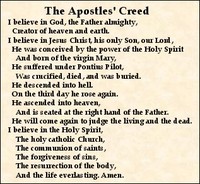The Third way knows the difference between essentials and non-essentials and lets the Way be shaped by the essentials. In the second chp of Adam Hamilton’s Seeing Gray in a World of Black and White: Thoughts on Religion, Morality, and Politics we hear an appeal for Christians to focus on essentials.
To permit non-essentials to shape our concerns, our relations, and our reputations is, to use the words of Jesus, to “strain gnats.” Hamilton here speaks of Matthew 23:34: “You strain out a gnat but swallow a camel!” Whether we think of the Pope’s statement about non-RC churches being defective, the American Episcopal leaders forcing their own way, the neo-Fundamentalists elevating women in ministry to a central idea, and the neo-Reformed contending that only the Reformed are truly faithful … we could go on … each of these somehow makes non-essentials the essential thing and each makes the non-essential what divides Christians from Christians.
Question of the day: What would be your top <strike>give</strike> five “essential beliefs” of the Christian faith? Is the Apostles’ Creed enough for you? What else might you want to add? Anything to subtract?
Adam Hamilton asks this question: “What if all 224 million Christians in America were actually working together to shape a nation that looks like Jesus’ vision of the kingdom of God, where poverty does not exist, where people practice justice, where love of neighbor is universally practiced? But this will never happen. We are too busy ‘straining gnats’.”
 What we need is discernment to see again and again what is essential about our faith and to see what is non-essential. This requires a firm grip on the essentials and a loose grip on the non-essentials. Sure, we will argue at times on the essentials … but surely we can begin with the classic creeds and the core gospel we believe.
What we need is discernment to see again and again what is essential about our faith and to see what is non-essential. This requires a firm grip on the essentials and a loose grip on the non-essentials. Sure, we will argue at times on the essentials … but surely we can begin with the classic creeds and the core gospel we believe.
Hamilton’s plea is for humility, beginning with this: “the hope for the future of Christianity will be found, in part, in our willingness to accept that no one of us has all the truth” (13). What is needed, he explains, is humility — humility about our own claims, about the legitimacy of the claims of others, and about it being God who has the truth.
